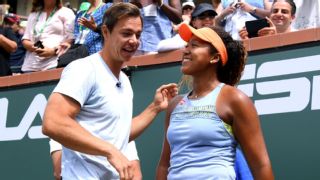|
NEW YORK -- It's the biggest day of Naomi Osaka's life. She is about to play her first Grand Slam final in a few hours. And she can't eat a bite of food. She can't even go near anything that smells like food. The mere thought of it makes her want to throw up. She woke up and found she sweat through her shirt. She spent hours pacing her hotel room and repeatedly called her sister, Mari, who tried to get her to think of the final as just another match. "I yelled at her and said, 'What do you mean just another match? It's a Grand Slam final and it's Serena!" Naomi recalls in her unique way of remembering conversations. But how is it the same Osaka, who couldn't keep food down mere hours before, stepped out onto the court for the final -- and handled the controversies which surrounded it -- to beat her opponent? And not just any opponent. If you have followed her on the main stage over the past year, it might not make any sense. Off the court, she shies away from people and conversations; she is self-admittedly nerdy and loves playing video games into the wee hours of the night; she gets, um, nervous, before big matches. She apologizes, a lot. She goes on random trains of thought and calls her brain weird. She is shy and funny, especially in press conferences. "She's such a perfectionist that she just gets down on herself and is too hard to herself, so I have to be the contrast to do that," Sascha Bajin, Osaka's coach and former hitting partner to the stars (Serena Williams, Caroline Wozniacki, to name a few), told reporters earlier this year. "If she's too negative, I have to go and say, 'It's OK. The earth is round. The grass is green.' And we keep moving on. But in general, she's more hard on herself than she should be. ... For a 20-year-old to stay this humble ... I mean, we went to the movies celebrating Indian Wells victory." On the court, a sense of calmness washes over her. She loves it when 20,000 people are watching her smash point after point, and when fans scream out words of support. She thrives when the crowd is against her. It all motivates her to play her best tennis. "I am not an attention seeker," Osaka says. "But whenever I play tennis, I feel like it's something that I am really good at and it's something that I know -- not that it's a talent, but that I have worked on it for so long, I want people to watch." That paradox has so far worked for Osaka, and it is also what will propel her to become one of tennis' biggest stars. Two hours after her 6-2, 6-4 victory against Williams, Osaka walked into the players' lounge, US Open trophy in hand, looking dazed and clearly overwhelmed by the number of reporters and organizers who are seated around the table ready to pepper her with questions. Bajin, who had just received his own US Open trophy (the coach of the winning player receives it later in the day), walks around and shows off his prize. "My trophy is here," he says loudly. She looks at him and smiles. "Normally I don't -- no offense you guys -- I don't really like being surrounded by people," she says. When one journalist asked her if she was worried about what her idol Serena would think of her after beating her for the second time this year, Osaka said, "Oh, god. I'd never thought of it that way. I hope Serena isn't mad at me or something." "Isn't it like raising a kid, though? The kid grows up with you and then you're looking at the kid like, 'Wow, I am proud of you,' and then you're cooking something in the kitchen and then the kid suddenly comes and cooks better than you. I don't know ..." She trails off. "I am sorry." (And it wasn't the first time she apologized during the roundtable conversation.) Even during the awards ceremony after her victory, one of the first words she said was sorry. "I know everyone was cheering for [Serena] and I'm sorry it had to end like this." But Osaka's ability to compartmentalize so early in her career was one of the factors that led her to her first career Grand Slam title. After her stellar run at Indian Wells in March, when she dropped just one set to win her first major tournament, Osaka had a bit of a slump, losing three straight matches (in Washington D.C., Montreal and Cincinnati) leading up to the US Open. She recalled crying in the locker room after each match, thinking she was a lousy tennis player. But she said she needed to experience failure to succeed again. She had to let go of the past and just do what she does best -- "hit the tennis ball and have fun while doing it," she says. Then, she arrived at the Open. Even before she hit a single ball in Flushing Meadows, experts and coaches expected her to make a breakthrough, and soon. Tsuyoshi Yoshitani, a sports reporter with Kyodo News predicted Osaka would become the first Japanese player to win a Grand Slam. Kei Nishikori told reporters early on in the tournament that Osaka was playing great tennis and had it in her to beat the top players. "I hit with Serena almost every day for eight years, and Naomi's weapons are just as big," Bajin said during a press conference leading up to the event. "She's not afraid of center stage, either, and that's why I believe she has greatness within her." During her quarterfinal match against Aryna Sabalenka, Osaka gestured with her hands and mumbled to herself after going down a break 2-1 in the third set. She was clearly mad that she'd made several forehand errors. Fans started to leave Louis Armstrong Stadium. But Osaka followed to break Sabalenka back 2-2 and went on to win the set (and the match) 6-3, 2-6, 6-4.  Against Madison Keys in the semifinal, Osaka saved 13 break points and ended up beating the American in straight sets. "You keep fighting, trying to get the break point, and then for her to come up with some of the shots, it was difficult," Keys said of Osaka after the loss. "But you're in that match and you think, 'OK, she's going to let up eventually.' She didn't, so ... all credit to her. For a first-time semifinalist on a big stage and all that, it was really impressive. She held her nerve the entire time, never really had any kind of slip-up." Throughout the final against Williams, Osaka said she thought to herself, "What would Serena do," whenever she played a shot. She was also realistic about her expectations. She'd told herself, "This is not over just because I am leading. Serena is going to come back as she has 1,000 times before." She says that thought process made her take every point seriously, because not doing so felt like a disrespect to the greatest athlete who ever played the sport. It's silly to make comparisons, but Osaka makes you feel the same way you do while watching Williams. It's not over until the players shake hands. If Osaka is down 15-40 at match point, you still find yourself thinking, "She is going to pull this off." When Caroline Wozniacki won the 2018 Australian Open, headlines read, "That was a surprise." When Simona Halep won the 2018 French Open, experts said, "Finally." Even when Angelique Kerber won 2018 Wimbledon, the odds still didn't have her winning the US Open. But, when Naomi Osaka won the 2018 US Open, experts' immediate reaction was, "This is it. This is the next star." Still, whether she has one Grand Slam or 10, Osaka says she is still going to feel slightly uncomfortable whenever she walks into a press conference. It's going to feel surreal holding any trophy and it's going to feel great playing in front of a huge crowd. None of those conflicting things are going to change just because of a Grand Slam title. "I will always stay the same person, I don't know how to be any other way," she says.
|

